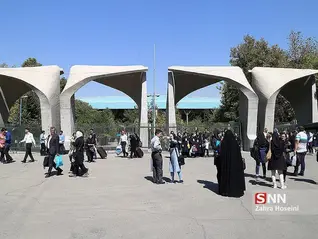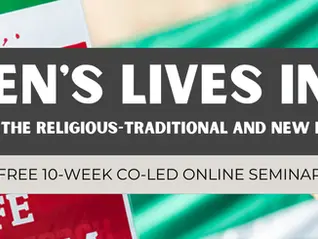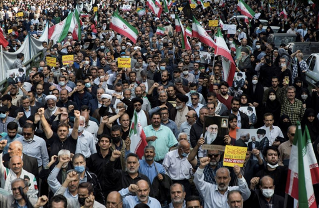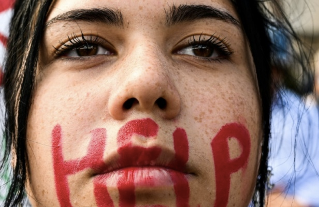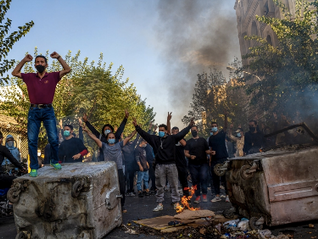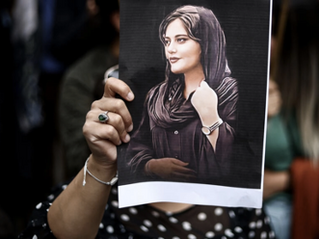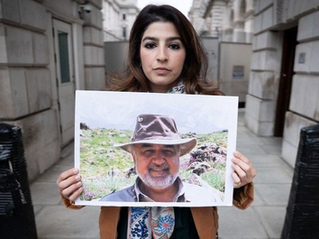Iran

Academic freedom in Iran continues to be seriously curtailed by a repressive government and this has become increasingly the case following the murder of Mahsa Amini in 2022, which sparked the nationwide “Woman, Life, Freedom” protests. Iranian universities continuously faced systematic repression under both the late President Ebrahim Raisi (2021-2024) and his successor, President Masoud Pezeshkian, who was elected in July 2024. In the past few years alone, thousands of students have been arrested, and hundreds of academics have been dismissed from their positions as campuses continue to face heavy securitization.
Iran’s education system continues to collapse under such political turmoil. Official figures by the Iranian government show that 929,798 students dropped out of school in 2022-23, with the majority of this number being students from secondary and primary school, while UNICEF estimates that over one million children are deprived of schooling. In 2024, the Academic Freedom Index reported that Iran was “completely restricted” in terms of academic freedom. In June 2024, following the presidential election, the government made promises to restore a degree of university autonomy, yet these promises remain unfulfilled.
Following Amini’s death in 2022, universities became the epicenters of resistance and the “Woman, Life, Freedom” protests became common ground for women and student protestors to mobilize. Out of the nearly 1,500 protests that occurred at the end of 2022, nearly 1,300 were women-led and over 70,000 students participated in demonstrations, with 96% of the students hailing from public universities. Allameh Tabataba’I University had the most protests, with 28 demonstrations, followed by Shahid Behesthti University with 26 demonstrations. The government responded with brutal force, resulting in the deaths of 458 individuals, including 63 children. Security forces, in violation of international law, used ambulances to infiltrate demonstrations and sexual violence against female detainees was widely reported. Revolutionary Courts also sentenced protestors to death. Mohsen Shekari, 23, was executed on December 8, 2022, followed by Majidreza Rahnavard, 23, who was publicly hanged on December 12. The crackdown on protestors since 2022 has been unprecedented, with approximately 19,000 people arrested, which includes more than 804 students. Amid the widescale suppression of the Women, Life, Freedom movement, there was also increased policing of female students dress code, such as the presence of Hijab enforcers at Tehran University, who monitor and surveil female staff, students, and faculty for non-compliance with the national mandate on religious dress codes.
Alongside repression of student’s political activities, the regime has also been using forced psychiatric hospitalization to delegitimize protestors’ right to protest. In November 2024, a female student at Islamic Azad University who stripped to her undergarments protesting hijab harassment was forcibly admitted to a psychiatric hospital. In the ongoing assault by the government, security forces raided high schools, detained underage students, and sent them to psychological centers to prevent them from “turning into anti-social people,” according to Education Minister Yousef Nouri. In order to be released from these facilities, which operate as detention centers, individuals must sign pledges to abide by state regulations. Between November 2022 and March 2023, more than 1,200 schoolgirls were poisoned. It is believed that these attacks were in retaliation against schoolgirls’ participation in protests.
In the last few years, Iran has also revived its “starred students” system, originally established during the 1980s Cultural Revolution, to identify and punish politically active students. Between 2022 and 2024, over 5,200 official disciplinary cases were registered. Many students were banned from universities, suspended, and summoned for disciplinary hearings in front of committees as a result of these cases. Two additional cases that highlight the ongoing attack on students in Iran include Ali Younesi and Amirhossein Moradi, both Sharif University students, who have been imprisoned since 2020 after unfair trials. They are still detained, participating in the “No to Executions” campaign from inside the prison.
In addition to students, the government has also focused on systematically purging universities of dissenting faculty. Nearly 100 academics were expelled, arrested, or incarcerated between 2021 and 2023, according to MESA’s Committee on Academic Freedom. Recent arrests include Professor Vasmaghi, a renowned theology scholar, arrested in March 2024 and transferred to Evin Prison. She was released in April 2024, having suffered life-threatening heart issues and losing her sight. Additionally, in November 2025, four progressive academics were arrested under “national security” charges. The case of Dr. Ahmadraza Djalali is particularly alarming, arrested in April 2016 when he visited University of Tehran to deliver a lecture. He was sentenced to death in 2017 on charges of espionage and is held in solitary confinement, awaiting execution. On May 8, 2025, Djalali suffered a heart attack and was initially denied medical care. Such cases point to the fact that Iran’s use of capital punishment has reached catastrophic levels.
Endangered Scholars Worldwide stands in solidarity with those who strive for freedom and safety across the world and especially with the people of Iran. We condemn the Iranian government’s systematic and recurrent breaches of international human rights law and the ill-treatment of protesters, as well as the attacks on students, scholars, and academic freedom. We call upon all international organizations and academic and professional associations devoted to the promotion and defense of human rights to join us in urging the Iranian government to end this ideologically motivated and inhumane crackdown on university campuses, disproportionately targeting women and young girls.
(Last updated: December 31, 2025)
Please send appeals to the following:
Ayatollah Ali Khamenei
The Office of the Supreme Leader
Jomhouri Street
Tehran
Islamic Republic of Iran
Fax: +98 21 644 11
Website: http://www.leader.ir/langs/en/
Facebook: https://www.facebook.com/www.Khamenei.ir
President Pezeshkian
The Office of the President
Palestine Avenue, Azerbaijan Intersection
Tehran
Islamic Republic of Iran
Seyed Abbas Araghchi
Minister of Foreign Affairs
The Minister’s Office
Imam Khomeini Square
Tehran
Islamic Republic of Iran
Fax: +98 21 66743149
Website: http://www.mfa.gov.ir
Volker Türk
United Nations High Commissioner for Human Rights
Office of the United Nations High Commissioner for Human Rights
Palais des Nations
CH-1211 Geneva 10, Switzerland
Email: InfoDesk@ohchr.org







